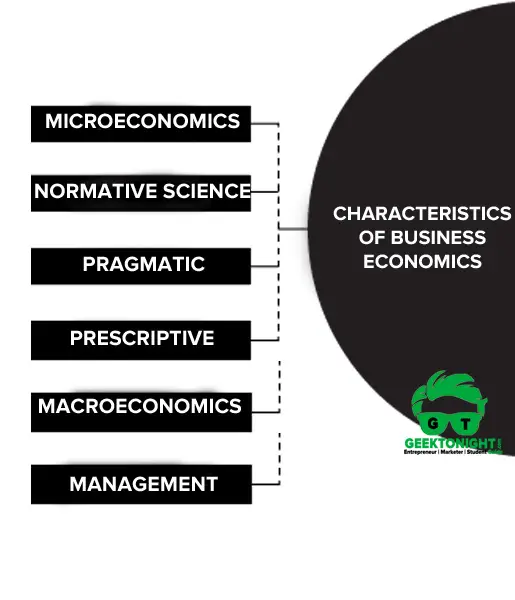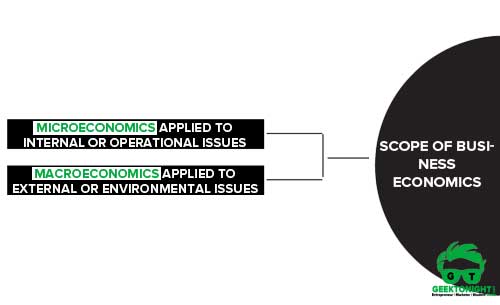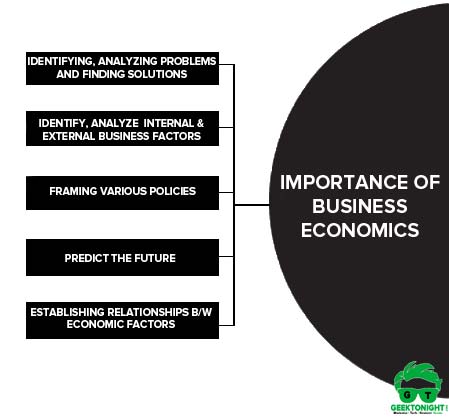What is Business Economics?
Business Economics is the integration of economic theory with business practice for the purpose of facilitating decision making and forward planning by management.
Business Economics, also referred to as Managerial Economics, generally refers to the integration of economic theory with business practice.
While the theories of Economics provide the tools, which explain various concepts such as demand, supply, costs, price, competition etc., Business Economics applies these tools in the process of business decision making.

Table of Content
Business Economics is playing an important role in our daily economic life and business practices. Organisations face many problems on a day to day basis. For example, organisations are always concerned with producing maximum output in the most economical way.
To solve problems of such nature, managers are required to apply various economic concepts and theories. The application of economic concepts, theories, and tools in business decision making is called business economics or managerial economics.
Also Read: What is Economics?
Business Economics Definition
Definition of economics by different economists have a different point of view, but the essence is the same. The following are some popular definition of business economics.
Managerial economics is concerned with the application of economic concepts and economics to the problems of formulating rational decision making.
Mansfield
Managerial economics is concerned with the application of economic principles and methodologies to the decision-making process within the firm or organization. It seeks to establish rules and principles to facilitate the attainment of the desired economic goals of management.
Douglas
Managerial economics applies the principles and methods of economics to analyze problems faced by the management of a business, or other types of organizations and to help find solutions that advance the best interests of such organization.
Davis and Chang
From the above-mentioned business economics definitions, it can be concluded that business economics is a link between two disciplines, which are management and economics.
The management discipline focuses on a number of principles that aid the decision-making process of organisations.
On the other hand, economics is related to the optimum allocation of limited resources for attaining the set objectives of organisations.
Also Read: Laws of Economics
Characteristics of Business Economics
Characteristics of business economics are:

Microeconomics
Business economics is microeconomic in character. This is so because it studies the problems of an individual business unit. It does not study the problems of the entire economy.
Normative science
Managerial economics is a normative science. It is concerned with what management should do under particular circumstances. It determines the goals of the enterprise. Then it develops the ways to achieve these goals.
Pragmatic
Business economics is pragmatic. It concentrates on making economic theory more application-oriented. It tries to solve the managerial problems in their day-to-day functioning.
Prescriptive
Managerial economics is prescriptive rather than descriptive. It prescribes solutions to various business problems.
Uses macroeconomics
Macroeconomics is also useful to business economics. Macro-economics provides an intelligent understanding of the environment in which the business operates.
Management oriented
The main aim of managerial economics is to help the management in taking correct decisions and preparing plans and policies for the future.
Scope of Business Economics
The scope of business economics is quite wide. Business economics involves the application of various economic tools, theories, and methodologies for analyzing solving different business problems.
Two Categories
There are two categories of business issues to which economic theories can be directly applied, namely:
- Microeconomics applied to internal or operational issues
- Macroeconomics applied to external or environmental issues

Therefore, the scope of Business Economics may be discussed under the above two heads.
Scope of microeconomics
Operational issues include all those issues that arise within the organisation and fall within the purview and control of the management.
The following Microeconomic theories deal with most of these issues.
- Demand analysis and forecasting: Demand analysis is a process of identifying potential consumers, the amount of goods they want to purchase, and the price they are willing to pay for it.
This process is important for an organisation to analyse the demand for its products, and to produce accordingly and helping organisations in business planning and deciding on strategic issues. - Cost and benefit analysis (CBA): By analysing costs, management can estimate costs required for running the organisation successfully.
Cost analysis helps firms in determining hidden and uncontrollable costs and taking measures for effective cost control. Also, help in determine the return on investment (ROI). - Pricing decisions, policies, and practices: Pricing is one of the key areas of business economics. It is a process of finding the value of a product or service that an organisation receives in exchange for its product/service.
The profit of an organisation depends a great deal on its pricing strategies and policies. Business economics includes various pricing-related concepts, such as pricing methods, product-line pricing, and price forecasting. - Profit maximisation: Profit generation and maximisation is the main aim of every organisation (except for non-profit organisations).
In order to maximise profit, organisations need to have complete knowledge about various economic concepts, such as profit policies and techniques, and break-even analysis. - Capital management: Organisations often find it difficult to make decisions related to capital investment. These decisions require sound knowledge and expertise in various economic aspects.
To make sound capital investment decisions, an organisation needs to determine various aspects, such as the cost of capital and rate of return. - Risk and Uncertainty Analysis: Business rms generally operate under conditions of risk and uncertainty.
Analysis of risks and uncertainties helps the business firm in arriving at efficient decisions and in formulating plans on the basis of past data, current information and future prediction.
Scope of macroeconomics
Environmental factors have signicant influence upon the functioning and performance of the business.
The major scope of macroeconomics factors relate to:
- The type of economic system stage of business cycle is the general trends in national income, employment, prices, saving and investment.
- Government’s economic policies like industrial policy, competition policy, monetary and scal policy, price policy, foreign trade policy and globalization policies.
- Working of nancial sector and capital market
- Socio-economic organisations like trade unions, producer and consumer unions and cooperatives.
- Social and political environment: Business decisions cannot be taken without considering these present and future environmental factors.
- Business decisions cannot be taken without considering these present and future environmental factors. As the management of the firm has no control over these factors, it should ne-tune its policies to minimise their adverse effects
Also Read: Difference Between Micro and Macro Economics
Importance of Business Economics
Business economics plays an important role in decision making in an organisation. Decision making is a process of selecting the best course of action from the available alternatives. Role and responsibilities of managerial economics are explained below.
The following points explain the importance of business economics:
- Identifying, analyzing problems and finding solutions
- Identify, analyze various internal & external business factors
- Framing various policies
- Predict the future
- Establishing relationships between different economic factors

- Business economics covers various important concepts, such as Demand and Supply analysis; Short run cost and Long run costs; and Law of Diminishing Marginal Utility. These concepts support managers in identifying and analysing problems and finding solutions.
- It helps managers to identify and analyse various internal and external business factors and their impact on the functioning of the organisation.
- Business economics helps managers in framing various policies, such as pricing policies and cost policies, on the basis of economic study and findings.
- By studying various economic variables, such as cost production and business capital, organisations can predict the future.
- Business economics helps in establishing relationships between different economic factors, such as income, profits, losses, and market structure. This helps in guiding managers in effective decision making and running the organisation.
Also Read: Nature of Economics
Difference Between Economics and Business Economics
| Economics | Business Economics |
|---|---|
| Economics is a traditional subject that has prevailed from a long time. | Business economics is a modern concept and is still developing. |
| Economics mainly covers theoretical aspects. | Business economics covers practical aspects. |
| In economics, the problems of individuals and societies are studied. | In Business economics, the main area of study is the problems of organizations. |
| In economics, only economic factors are considered. | In business economic, both economic and non-economic factors are considered. |
| Both microeconomics and macroeconomics fall under the scope of economics. | Only microeconomics falls under the scope of business economics. |
| Economics has a wider scope and covers the economic issues of nations. | Business economics is a part of economics and is limited to the economic problems of organisations |
Summary of Business Economics
Business Economics comprises of that part of economic knowledge, logic, theories and analytical tools that are used for rational business decision making. In brief, it is Applied Economics that fills the gap between economic theory and business practice.
The scope of business economics is quite wide. It covers most of the practical problems a manager or a firm faces.
It can be concluded that Business Economics is a link between two disciplines, which are management and economics.
- The management discipline focuses on a number of principles that aid the decision-making process of organisations.
- On the other hand, economics is related to the optimum allocation of limited resources for attaining the set objectives of organisations.
Therefore, it can be said that business economics is a special discipline of economics that can be applied in business decision making of organisations. Also, the Importance of business Economics plays a crucial role in decision making in an organisation.
Also Read: Demand Forecasting
FAQ
Nature of economics is broadly categories into 3 types:
Economics as a Science
Economics as an Art
Economics as a social science
Read Complete Article: Nature of Economics
Two type of Laws of Economic are:
Law of demand
Law of supply
Read Complete Article: Laws of Economics
Business Economics Tutorial
(Click on Topic to Read)
Go On, Share article with Friends
Did we miss something in Business Economics Tutorial? Come on! Tell us what you think about our article on What is Business Economics? | Business Economics in the comments section.
Business Economics Tutorial
(Click on Topic to Read)












very useful notes